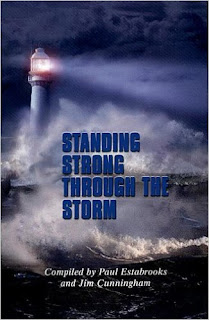Today’s Verse-of-the-Day:
I, even I, am the Lord; and beside me there is no saviour. I have declared, and have saved, and I have shewed, when there was no strange god among you: therefore ye are my witnesses, saith the Lord, that I am God.Idolaters are called to appear in defense of their idols. Those who make them, and trust in them, are like unto them. They have the shape and faculties of men, but they have not common sense. But God's people know the power of his grace, the sweetness of his comforts, the kind care of his providence, and the truth of his promise. All servants of God can give such an account of what he has wrought in them, and done for them, as may lead others to know and believe his power, truth, and love.
Today’s Readings:
1 Praise ye the Lord. O give thanks unto the Lord; for he is good: for his mercy endureth for ever.None of our sins or sufferings should prevent our ascribing glory and praise to the Lord. The more unworthy we are, the more is his kindness to be admired. And those who depend on the Redeemer's righteousness will endeavor to copy his example, and by word and deed to show forth his praise. God's people have reason to be cheerful people and need not envy the children of men their pleasure or pride. Here begins a confession of sin; for we must acknowledge that the Lord has done right, and we have done wickedly. Often have we set up idols in our hearts, cleaved to some forbidden object; so that if a greater than Moses had not stood to turn away the anger of the Lord, we should have been destroyed.
2 Who can utter the mighty acts of the Lord? who can shew forth all his praise?
3 Blessed are they that keep judgment, and he that doeth righteousness at all times.
4 Remember me, O Lord, with the favour that thou bearest unto thy people: O visit me with thy salvation;
5 That I may see the good of thy chosen, that I may rejoice in the gladness of thy nation, that I may glory with thine inheritance.
6 We have sinned with our fathers, we have committed iniquity, we have done wickedly.
19 They made a calf in Horeb, and worshipped the molten image.
20 Thus they changed their glory into the similitude of an ox that eateth grass.
21 They forgat God their saviour, which had done great things in Egypt;
22 Wondrous works in the land of Ham, and terrible things by the Red sea.
23 Therefore he said that he would destroy them, had not Moses his chosen stood before him in the breach, to turn away his wrath, lest he should destroy them.
24:1 And he said unto Moses, Come up unto the Lord, thou, and Aaron, Nadab, and Abihu, and seventy of the elders of Israel; and worship ye afar off.A solemn covenant was made between God and Israel. Very solemn it was, typifying the covenant of grace between God and believers, through Christ. As soon as God separated to himself a peculiar people, he governed them by a written word, as he has done ever since. God's covenants and commands are so just in themselves, and so much for our good, that the more we think of them, and the more plainly and fully they are set before us, the more reason we may see to comply with them. The blood of the sacrifice was sprinkled on the altar, on the book, and on the people. Neither their persons, their moral obedience, nor religious services, would meet with acceptance from a holy God, except through the shedding and sprinkling of blood. Also, the blessings granted unto them were all of mercy; and the Lord would deal with them in kindness. Thus the sinner, by faith in the blood of Christ, renders willing and acceptable obedience.
2 And Moses alone shall come near the Lord: but they shall not come nigh; neither shall the people go up with him.
3 And Moses came and told the people all the words of the Lord, and all the judgments: and all the people answered with one voice, and said, All the words which the Lord hath said will we do.
4 And Moses wrote all the words of the Lord, and rose up early in the morning, and builded an altar under the hill, and twelve pillars, according to the twelve tribes of Israel.
5 And he sent young men of the children of Israel, which offered burnt offerings, and sacrificed peace offerings of oxen unto the Lord.
6 And Moses took half of the blood, and put it in basons; and half of the blood he sprinkled on the altar.
7 And he took the book of the covenant, and read in the audience of the people: and they said, All that the Lord hath said will we do, and be obedient.
8 And Moses took the blood, and sprinkled it on the people, and said, Behold the blood of the covenant, which the Lord hath made with you concerning all these words.
5:1 The elders which are among you I exhort, who am also an elder, and a witness of the sufferings of Christ, and also a partaker of the glory that shall be revealed:The apostle Peter does not command but exhorts. He does not claim the power to rule over all pastors and churches. It was the peculiar honor of Peter and a few more, to be witnesses of Christ's sufferings; but it is the privilege of all true Christians to partake of the glory that shall be revealed. These poor, dispersed, suffering Christians, were the flock of God, redeemed to God by the great Shepherd, living in holy love and communion, according to the will of God. They are also dignified with the title of God's heritage or clergy; his peculiar lot, chosen for his own people, to enjoy his special favor, and to do him special service. Christ is the chief Shepherd of the whole flock and heritage of God. And all faithful ministers will receive a crown of unfading glory, infinitely better and more honorable than all the authority, wealth, and pleasure of the world.
2 Feed the flock of God which is among you, taking the oversight thereof, not by constraint, but willingly; not for filthy lucre, but of a ready mind;
3 Neither as being lords over God's heritage, but being examples to the flock.
4 And when the chief Shepherd shall appear, ye shall receive a crown of glory that fadeth not away.
5 Likewise, ye younger, submit yourselves unto the elder. Yea, all of you be subject one to another, and be clothed with humility: for God resisteth the proud, and giveth grace to the humble.
12 By Silvanus, a faithful brother unto you, as I suppose, I have written briefly, exhorting, and testifying that this is the true grace of God wherein ye stand.
13 The church that is at Babylon, elected together with you, saluteth you; and so doth Marcus my son.
14 Greet ye one another with a kiss of charity. Peace be with you all that are in Christ Jesus. Amen.
In conclusion, the apostle prays to God for them, as the God of all grace. Perfect implies their progress towards perfection. Stablish imports the curing of our natural lightness and inconstancy. Strengthen has respect for the growth of graces, especially where weakest and lowest. Settle signifies to fix upon a sure foundation, and may refer to Him who is the Foundation and Strength of believers. These expressions show that perseverance and progress in grace are first to be sought after by every Christian. The power of these doctrines on the hearts, and the fruits in the lives, showed who are partakers of the grace of God. The cherishing and increase of Christian love, and of affection one to another, is no matter of empty compliment, but the stamp and badge of Jesus Christ on his followers. Others may have a false peace for a time, and wicked men may wish for it to themselves and to one another, but theirs is a vain hope and will come to naught. All solid peace is founded on Christ and flows from him.
The Bible texts of the Old Testament, Epistle, and Gospel lessons are from The Holy Bible, King James Version (KJV).
Commentaries from Matthew Henry's Concise Commentary on the Bible.
The Daily Bible Readings are selected from the Revised Common Lectionary Daily Readings, a three-year cyclical lectionary. We are currently in Year A. Beginning with the first Sunday of Advent in 2020, we will be in Year B. The year which ended at Advent 2019 was Year C. These readings complement the Sunday and festival readings: Thursday through Saturday readings help prepare the reader for the Sunday ahead; Monday through Wednesday readings help the reader reflect and digest what they heard in worship. Revised Common Lectionary Daily Readings, copyright © 2005 Consultation on Common Texts. www.commontexts.org
The Daily Readings for THURSDAY, October 8, 2020
Psalm 106:1-6, 19-23; Exodus 24:1-8; 1 Peter 5:1-5, 12-14 (KJV)










